National Education Policy 2020: Visionary charter educracy shadow
Formulated after an interregnum of 34 years and crafted over four years following recommendations of two high-powered committees, the new education policy aroused great expectations. But NEP 2020 is an amalgam of high rhetoric clouded by implementation uncertainty because of its conspicuous failure to make a clean break from bureaucratic control-and-command – Dilip Thakore
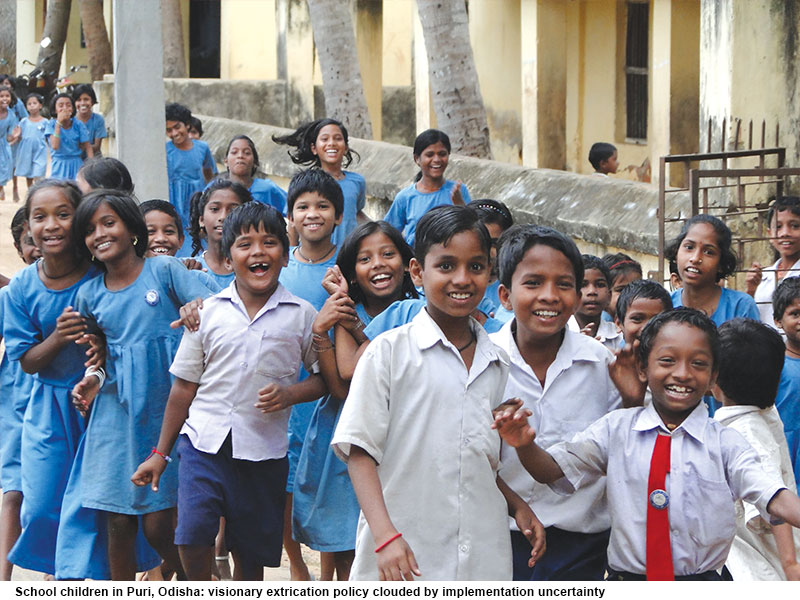
The great expectation was that the new National Education Policy 2020 formulated after an interregnum of 34 years and crafted over four years following the detailed recommendations of two high-powered — TRS Subramanaian (2016) and the Dr. K. Kasturirangan (2018) — committees, would be a monumental, path-breaking blueprint. The anticipation was a re-engineering of the world’s largest education ecosystem to extricate 21st century India’s 256 million school children and 30 million youth in higher education from the mire in which they have been floundering for over seven decades. Instead, the 65-page policy document presented to the public at a virtual press conference in Delhi by former Union human resource development (HRD) minister Prakash Javadekar and incumbent Union education minister (the name of the ministry has changed) Dr Ramesh Pokhriyal ‘Nishank’ (a nom de plume) on July 29, is an amalgam of high rhetoric clouded by implementation uncertainty, because of its conspicuous failure to make a clean break with bureaucratic control-and-command.
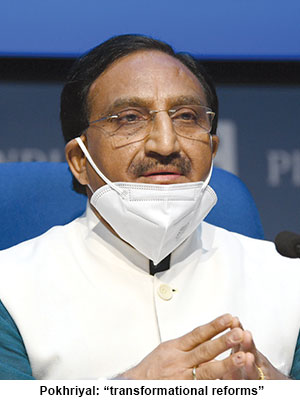 The policy charter acknowledges that “providing universal access to quality education is the key to India’s continued ascent and leadership on the global stage in terms of economic growth, social justice and equality, scientific advancement, national integration and cultural preservation”. But it fails to address the debilitating problems of Indian education — excessive bureaucracy, chronic underfunding and under-regulation of public education, a sin compounded by over-regulation of the country’s relatively superior private education system. When the diagnosis is faulty, repairing a dysfunctional system is certain to be a long and painful trial-and-error treatment.
The policy charter acknowledges that “providing universal access to quality education is the key to India’s continued ascent and leadership on the global stage in terms of economic growth, social justice and equality, scientific advancement, national integration and cultural preservation”. But it fails to address the debilitating problems of Indian education — excessive bureaucracy, chronic underfunding and under-regulation of public education, a sin compounded by over-regulation of the country’s relatively superior private education system. When the diagnosis is faulty, repairing a dysfunctional system is certain to be a long and painful trial-and-error treatment.
Dr. Ramesh Pokhriyal, the newly rechristened education minister, who began his career in a Shishu Mandir school promoted by the RSS, the ideological mentor organisation of the ruling BJP and was awarded this critical position in May 2019, promises that NEP 2020 “will bring transformational reforms in school and higher education systems in the country,” according to a ministry statement issued on July 29 by the Press Information Bureau of the government of India. His deputy, Sanjay Dhotre, minister of state for education, is more bullish. “NEP 2020 is the most comprehensive, radical and futuristic policy document in the educational history of this country,” says his official statement. Unfortunately, wishes are not horses and normatively in post-independence India, vaulting ambition falls on the other side.
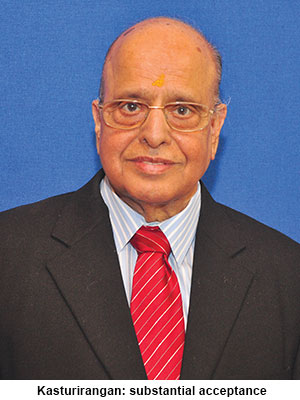 The upside of NEP 2020 is that it has substantially accepted the recommendations of the nine-member Dr. K. Kasturirangan (KR) Committee Report submitted to the Union HRD ministry in May 2019. The committee’s comprehensive 484-page report had made several sensible and overdue recommendations including unprecedented stress on ECCE (early childhood care and education), high priority for functional literacy and numeracy of all children by age eight; encouraging holistic school education with compulsory vocational learning; exam reforms to test children’s conceptual comprehension, creativity and critical thinking capabilities rather than memory; introduction of continuous formative assessment systems to replace summative exams, and promotion of new digital technologies usage in school education.
The upside of NEP 2020 is that it has substantially accepted the recommendations of the nine-member Dr. K. Kasturirangan (KR) Committee Report submitted to the Union HRD ministry in May 2019. The committee’s comprehensive 484-page report had made several sensible and overdue recommendations including unprecedented stress on ECCE (early childhood care and education), high priority for functional literacy and numeracy of all children by age eight; encouraging holistic school education with compulsory vocational learning; exam reforms to test children’s conceptual comprehension, creativity and critical thinking capabilities rather than memory; introduction of continuous formative assessment systems to replace summative exams, and promotion of new digital technologies usage in school education.
In higher education, the KR Committee proposed four year undergad degree programmes with a foundational year of liberal arts learning for all study programmes; certified multiple exit and re-entry options and a system of credits to be stored in a national ABC (academic bank of credits) digital repository; phasing out the system of all undergrad colleges affiliating with parent universities, and graded autonomy for undergrad colleges under a ‘light but tight’ regulatory framework; establishment of a National Research Foundation and permitting top-ranked foreign universities to set up campuses in India. Moreover, an important recommendation of the KR Committee to separate the functions of regulation, accreditation, funding and academic standards setting has been incorporated into NEP 2020.
The new policy decrees establishment of a Higher Education Council of India (HECI) as “an umbrella institution” with four verticals — National Higher Education Regulatory Council (NHERC) — “the single point regulator for the higher education sector including teacher education but excluding medical and legal education”. The role of NHERC is to “regulate in a light but tight and facilitative manner, meaning that a few important matters, particularly financial probity, good governance and full online and offline public disclosure of all finances, audits, procedure, infrastructure, faculty/staff, courses and educational outcomes will be very effectively regulated”. All this information will need to be “kept updated and accurate” by HEIs (higher education institutions) themselves on the NHERC and institutional websites.
Significantly, any complaints and grievances from stakeholders and others “arising out of information placed in the public domain shall be adjudicated by NHERC”. This provision (para 18.3) will open the gates for thousands of unemployed busybodies to file complaints about financial probity, personnel grievances and good governance against HEIs, particularly private colleges and universities. HEIs should budget for spending considerable time and money arguing their cases before NHERC forums.
The second vertical decreed is the National Accreditation Council (NAC) — “a meta-accrediting body to certify HEIs “primarily on basic norms, public self-disclosure, good governance and outcomes”. This council will create “an independent ecosystem of accrediting institutions supervised and overseen by NAC” so that a robust system of graded accreditation shall be established. For the convenience of these accrediting institutions, all HEIs are required to draw up detailed IDPs (institutional development plans) “to attain the highest level of accreditation over the next 15 years”, says the NEP 2020 policy document (para 18.4).
The third vertical under HECI is the Higher Education Grants Council (HEGC) which takes over the funding function of the University Grants Commission (UGC). Allocated Rs.4,693 crore in the Union budget 2020-21, UGC subsidised Central government universities and occasionally funded specific projects of state government universities. Under the new policy, HEGC will “carry out funding and financing of higher education based on transparent criteria”, and also disburse “scholarships and developmental funds for launching new focus areas and expanding quality programme offerings at HEIs across disciplines and fields”.
And the fourth vertical is the General Education Council (GEC), established to set learning outcome benchmarks aka “graduate attributes” for all study programmes offered by higher education institutions. Among the mandates of GEC: to formulate a National Higher Education Skills Framework (NHEQF) which should be in sync with the National Skills Qualification Framework (NSQF) to “ease the integration of vocational education into higher education”.
Similarly for school education, NEP 2020 recommends a regulatory structure headed by a Department of Education in all states and Union territories for “overall monitoring and policymaking for continual improvement of the public education system”. Operations and policy implementation falls within the purview of the Directorate of School Education, while an independent State School Standards Authority (SSSA) will set standards for basic parameters (safety, security, basic infrastructure, teacher adequacy, financial probity and sound processes of governance) (para 8.5).
All schools are obliged to make full disclosure of information as per the (no doubt elaborate) format prescribed by SSSA on their websites with SSSA empowered to adjudicate “any complaints or grievances” arising out of the information so posted. Academic matters “including academic standards and curricula in every state will be supervised by existing State Councils of Education Research & Training (SCERT) which will be “reinvigorated” (para 8.5).
Prudently, a proposal of the KR Committee to appoint an Education Commission at the Centre with the prime minister as chairman and Union HRD/education minister as vice chairman and similar apex Rajya Shiksha Aayog or State Education Commissions with the chief minister as chairman and education minister as vice chairman, has been dropped. This recommendation, if accepted, could have resulted in the politicisation of education which is surely worse than the commercialisation of education which is anathema to the KR Committee and NEP 2020. But given the wellknown anxiety of the RSS which has promoted and manages 17,000 Shishu Mandir schools across the country to influence, if not shape Indian education, one can’t rule out the prime minister chairing HECI.
Commendably, deep and heavy contemplation has been invested by members of the Kasturirangan Committee which designed the architecture of the “independent” regulatory institutions for governance and supervision of the preschool-class XII and higher education sectors. Yet this presumption — unchallenged by the army of academics, K-12 educators and media pundits — that Indian education needs greater government intervention and supervision needs to be questioned.
In this connection, it’s worth noting that T.S.R Subramanian was a career civil servant who over four decades in the IAS rose to the apex position of cabinet secretary, and Dr. Kasturirangan made a career in the highlyrespected government-owned Indian Space Research Organisation (ISRO) where he rose to the position of chairman. The members of both committees were drawn from governmentfunded public universities without any private sector representation although 47 percent of the country’s in-school children, and 66 percent of youth in higher education are enrolled in private colleges, universities and institutions. The sole private HEI rep in the KR Committee was Manjul Bhargava, professor of mathematics at the offshore Princeton University, New Jersey (USA), while the other members of the nine-strong KR Committee were vice chancellors of obscure provincial universities and the Left-dominated JNU, pathetically dependent on the largesse of the Central government.
It’s self-evident, if not axiomatic, that such sarkari committees can never entertain the proposition that government supervision which rapidly transforms into micro-management in Indian conditions, is the problem — rather than solution — of Indian education. The elaborate governance architecture prescribed by the KR Committee and adopted by NEP 2020 sits ill at ease with the promises of autonomy and self-regulation made in the policy document. The proposition that schools and higher education institutions can be well-governed by highly-educated and experienced principals, deans and vice chancellors who are mindful of the reputation of institutions under their watch and accountable to their stakeholders to provide acceptable learning outcomes, is beyond the imagination of establishment academics and career bureaucrats. What India’s beleaguered education institutions urgently need is autonomy and a governance framework of the trust and verify model.
The basic presumption of the formulators of NEP 2020 that leaders of schools and HEIs need detailed guidance and prescriptions from an alphabet soup of government-managed institutions, to improve learning outcomes and institutional reputation, is flawed, if not entirely fallacious.
 NEP 2020 is an excellent guidance document which offers several overdue reform recommendations. Its emphasis on early childhood education and foundational learning and numeracy as the cornerstones of the education system, board exam reforms and introduction of formative assessment, will undoubtedly build a solid learning foundation for India’s children and youth. But curiously, the contribution of the country’s private schools to Indian K-12 education is glossed over in the new policy, except to say that parents and communities need to be protected from arbitrary increases in tuition fees. The plain truth as highlighted in our Private Schools in India Report released on July 22, is that 47 percent of school-going children are enrolled in the country’s 450,000 private schools. These are not elitist, exclusive institutions as popularly believed. Seventy percent of them levy tuition fees of less than Rs.1,000 per month and 45 percent of less than Rs.500. Discriminatory provisions in the RTE Act, 2009 and legislation of several state governments should have been removed by NEP 2020,” says Ashish Dhawan, a Yale and Harvard-educated alum who forsook a successful career in private equity and investment banking (Chrys Capital) to promote the K-12 education-focused Central Square Foundation, Delhi (estb.2012) to improve the learning outcomes of all children, especially from low-income communities.
NEP 2020 is an excellent guidance document which offers several overdue reform recommendations. Its emphasis on early childhood education and foundational learning and numeracy as the cornerstones of the education system, board exam reforms and introduction of formative assessment, will undoubtedly build a solid learning foundation for India’s children and youth. But curiously, the contribution of the country’s private schools to Indian K-12 education is glossed over in the new policy, except to say that parents and communities need to be protected from arbitrary increases in tuition fees. The plain truth as highlighted in our Private Schools in India Report released on July 22, is that 47 percent of school-going children are enrolled in the country’s 450,000 private schools. These are not elitist, exclusive institutions as popularly believed. Seventy percent of them levy tuition fees of less than Rs.1,000 per month and 45 percent of less than Rs.500. Discriminatory provisions in the RTE Act, 2009 and legislation of several state governments should have been removed by NEP 2020,” says Ashish Dhawan, a Yale and Harvard-educated alum who forsook a successful career in private equity and investment banking (Chrys Capital) to promote the K-12 education-focused Central Square Foundation, Delhi (estb.2012) to improve the learning outcomes of all children, especially from low-income communities.
Although NEP 2020 directs all regulatory authorities to desist from making distinction between public and private schools, there is a discernible thread of prejudice against private schools and HEIs running through the policy document. While acknowledging that the “current regulatory regime has not been able to curb the commercialisation and economic exploitation of parents” by “many” for-profit schools, NEP 2020 admits there has been “far too much asymmetry between regulatory approaches to public and private schools,” and professes an intent to create level playing field in preschool to class XII education. Yet as indicated by several references to commercialisation and exploitation of students by private education institutions in the policy document, antiprivate prejudice is deeply ingrained in government.
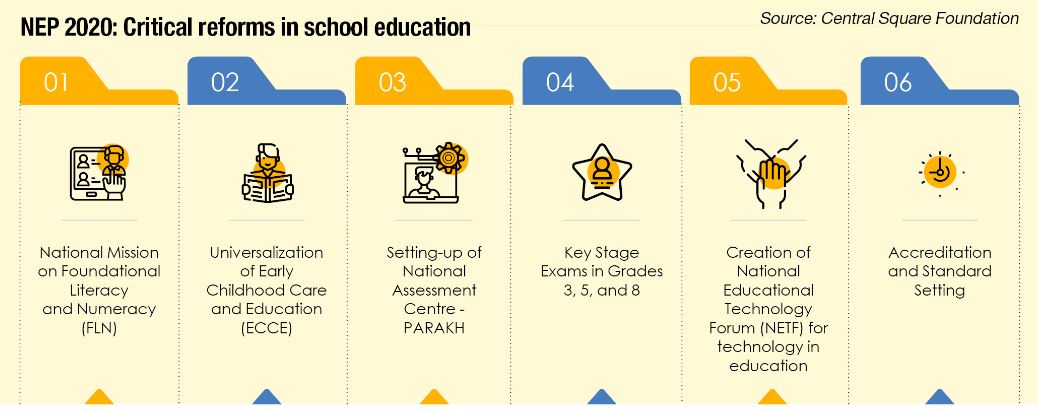
In this connection, it’s pertinent to note that the KR Committee’s NEP draft devoted a paragraph under a separate heading “regulation and oversight of private schools” drawing a distinction between philanthropic and “commercial” enterprises with the former to be encouraged and the latter to remain not-for-profit and subject to supervision by School Management Committees (SMCs) established under s.21 of the RTE Act, 2009. Commendably, NEP 2020 has diluted the committee’s prejudice against private schools by explicitly stating that they are to be “assessed, and accredited on the same criteria, benchmarks and processes” as public/government schools subject to full online and offline transparency.
Moreover, NEP 2020 makes an unprecedented distinction between “public spirited private schools” and others. The former are to be “encouraged and not stifled in any way” (para 8.7). The recommendation of the KR Committee that private schools should be subject to supervision by SMCs which would have translated into supervision by amateur parents and local politicians — has to the great relief of private school managements — been dropped. The fine print of NEP 2020 also suggests that the new policy is not opposed to greenfield schools levying high tuition and other fees commensurate with promoters’ investment in infrastructure and highly qualified teachers, but only against “arbitrary increases” of annual fees to protect parents and communities.
On the issue of state governments regulating and adjudicating school tuition and other fees — the biggest pain point of private school managements who argue that holistic first world education vociferously demanded by parents and students cannot be provided at third world prices — NEP 2020 is conspicuously silent. Ditto about “partial backdoor nationalisation” of private schools effected through s.12 (1) (c) of the RTE Act which obliges private day schools to reserve 25 percent capacity in elementary classes (IVIII) for poor children — as certified by state and local governments — in their neighbourhood.
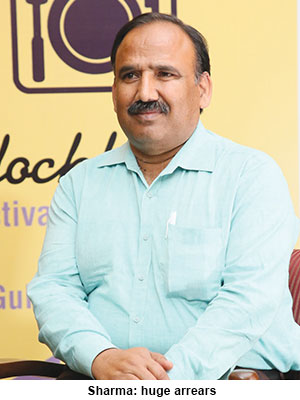 The cost of educating poor children thus admitted by private schools is to be borne by state governments obliged iniquitously, to pay private schools the equivalent of per-child expenditure incurred by them in government schools. According to Kulbhushan Sharma, president of the Delhi-based NISA (National Independent Schools Alliance) which has a membership of 60,000 mainly low-priced budget private schools (BPS), state governments owe arrears of “lakhs of crores” to budget private schools under this account.
The cost of educating poor children thus admitted by private schools is to be borne by state governments obliged iniquitously, to pay private schools the equivalent of per-child expenditure incurred by them in government schools. According to Kulbhushan Sharma, president of the Delhi-based NISA (National Independent Schools Alliance) which has a membership of 60,000 mainly low-priced budget private schools (BPS), state governments owe arrears of “lakhs of crores” to budget private schools under this account.
NEP 2020 is also silent about legislation enacted by most state governments capping fees levied by private schools at unrealistically low levels, and about s.19 of the RTE Act which stipulates impossible infrastructure norms for private schools. This provision was deliberately inserted into the RTE Act to drive the country’s estimated 400,000 budget private schools (BPS), which are attracting government school students by thousands per day, out of business.
With education being a concurrent subject under the Constitution subject to Central and state jurisdiction, state government legislation capping private school fees, imposing their regional languages etc is unlikely to be rescinded. Neither is the Central government likely to alter or amend s.12 (1) (c) and s.19 of the RTE Act or allow the promotion of for-profit schools. Indeed NEP 2020 repeatedly commends “private philanthropic efforts for quality education” and reiterates that all private schools and HEIs must compulsorily be “not-for-profit entities”.
The insistence of NEP 2020 that all private schools and private HEIs have to subscribe to the elaborate fiction that they are being run as charitable, not-for-profit institutions — when the grassroots reality is that unless the country’s 375,000 independent schools and 400,000 BPS record profits, they would have to shut down — exasperates informed monitors of India’s confusing education ecosystem.
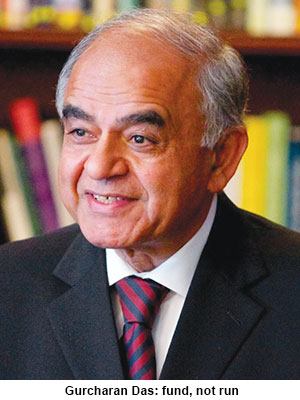 “Education is a public good like roads or public buses. The government doesn’t have to build roads or run buses. Similarly, it should fund schools, not run them. Instead of cheap talk against profit and eulogising philanthropy, NEP 2020 should have shed hypocrisy and been more honest. 85 percent of India’s private schools survive only if they make a profit. If nine out of the world’s top ten economies allow for-profit schools, why can’t India? This single change will bring huge investments into education, improve quality and choice. Principals wouldn’t have to lie or be called thieves. Black money would be curbed,” says well-known public intellectual, newspaper columnist and author (India Unbound, The Difficulty of Being Good) Gurcharan Das, in an anguished op-ed critique of NEP 2020 in the Times of India (August 1)
“Education is a public good like roads or public buses. The government doesn’t have to build roads or run buses. Similarly, it should fund schools, not run them. Instead of cheap talk against profit and eulogising philanthropy, NEP 2020 should have shed hypocrisy and been more honest. 85 percent of India’s private schools survive only if they make a profit. If nine out of the world’s top ten economies allow for-profit schools, why can’t India? This single change will bring huge investments into education, improve quality and choice. Principals wouldn’t have to lie or be called thieves. Black money would be curbed,” says well-known public intellectual, newspaper columnist and author (India Unbound, The Difficulty of Being Good) Gurcharan Das, in an anguished op-ed critique of NEP 2020 in the Times of India (August 1)
The obstinate refusal of the professedly ideologically right-wing BJP government to permit straightforward for-profit schools and HEIs to operate in India and to persist with maintaining the fiction that private schools are charitable institutions, is an indicator of the extent to which socialist command-and-control culture has permeated all political parties of post-independence India. Although the licence-permit-quota regimen has been considerably relaxed for Indian industry after the historic liberalisation and deregulation initiative of 1991, the education sector continues to remain the happy hunting ground of the neta-babu brotherhood on the matter of teacher appointments in government schools and HEIs, textbook printing rackets, teacher transfers and continuous shaking down of private school managements for real and imagined infractions of thousands of highly discretionary rules and regulations legislated by state and municipal governments.
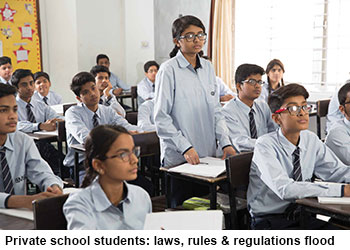 Curiously, rigid government control over private education institutions continues unabated despite the Supreme Court having overruled its earlier judgements endorsing tight government control of private education institutions. In the historic T.M.A. Pai Foundation Case (2002), an 11-judge bench of the apex court ruled that all citizens have a fundamental right to establish and administer educational institutions of their choice under Article 30 (1) of the Constitution. Moreover, the apex court held that the right to administer includes the right to admit students on merit in a fair and transparent manner, to levy reasonable fees and to make reasonable profit for reinvestment in education. The ratio decidendi of the T.M.A. Pai Case was upheld in P.A. Inamdar’s Case (2005).
Curiously, rigid government control over private education institutions continues unabated despite the Supreme Court having overruled its earlier judgements endorsing tight government control of private education institutions. In the historic T.M.A. Pai Foundation Case (2002), an 11-judge bench of the apex court ruled that all citizens have a fundamental right to establish and administer educational institutions of their choice under Article 30 (1) of the Constitution. Moreover, the apex court held that the right to administer includes the right to admit students on merit in a fair and transparent manner, to levy reasonable fees and to make reasonable profit for reinvestment in education. The ratio decidendi of the T.M.A. Pai Case was upheld in P.A. Inamdar’s Case (2005).
Unfortunately, the clear reasoning of the majority judgement in the T.M.A. Pai Case was muddied by a smaller five-judge bench of the apex court in Islamic Academy vs. Union of India (2003), in which the court decreed establishment of committees chaired by retired judges in all states to adjudicate whether the admission processes of private education institutions are indeed fair and transparent, and determine whether the fees charged by them are reasonable.
This revisionist judgement of the Supreme Court served to encourage state governments to introduce a spate of laws, rules and regulations to dilute the autonomy of private schools and legislate tuition fees ceilings, and bind private school managements in prolonged litigation and red tape. In recent years, almost all state governments have introduced fees control regulations and ceilings forcing private school managements to divert their attention from institutional management to fighting courtroom battles.
Contemptuous indifference of the educracy to Supreme Court judgements and its reckless disregard of well-established precedents is also manifested in NEP 2020’s stated intent to make the “mother tongue or local language” the medium of instruction “until at least Grade 5, but preferably until till Grade 8” in all primary schools — public and private — across the country (para 4.11). This recommendation made by the KR Committee reportedly to appease the superpatriots of the RSS who haven’t yet grasped the simple truth that English is the link language that binds India’s 22 linguistic states in which people speak 278 dialects, and foolishly incorporated into NEP 2020, is clear proof that the babus of Shastri Bhavan, Delhi (HQ of the Union education ministry) have no market intelligence and are cut off from reality.
They seem blissfully unaware that the medium of instruction debate has been raging for decades and that after prolonged litigation in KAMS vs. Government of Karnataka (2014), the Supreme Court decisively ruled that regardless of expert opinion, the choice of medium of instruction at all levels of schooling is of parents. A three-judge bench of the apex court held that a 1994 ordinance of the Karnataka state government that made Kannada or mother tongue the medium of instruction in primary schooling until class V, was violative of Articles 19 (1) (g), 26 and 30 (1) of the Constitution. “The choice of medium of instruction is that of the child and it should be left to the parents of the child. It is the element of compulsion which is frowned upon. It is arbitrary. It offends fundamental rights guaranteed to the citizens of this country… If parents want their children to have primary education in English medium, they are not committing any crime. It is not illegal. It is not opposed to public policy,” ruled the apex court in a unanimous judgment.
However this definitive, unambiguous judgement of a three-judge bench of the highest court of the land is of obviously no consequence to the KR Committee or to Union education minister Dr. Ramesh Pokhriyal, because NEP 2020 has resurrected this hoary settled issue. Concurrently, NEP 2020 has raised the old bogey of all primary-secondary children learning three languages with “at least two of three languages native to India”. Although the policy document unequivocally states that “no language shall be imposed on any state”, governments of southern states who fiercely resisted the imposition of Hindi as the national language way back in the 1960s, have been quick to interpret this edict as yet another covert attempt by the BJP government at the Centre to impose Hindi and/or Sanskrit on the southern states. Ironically, the loudest protest has come from the ruling AIADMK party — an ally of the BJP — of Tamil Nadu which reiterated that only English and Tamil will be taught in the state’s schools.
This messing about with medium of instruction and concerted covert efforts to impose Hindi as the national language — in his national addresses prime minister Narendra Modi uses Hindi which is not understood by 59 percent of the citizenry, and Union education minister Ramesh Pokhriyal is reportedly wholly unacquainted with English, the associate and link language of India — could cost the high-flying BJP heavily.
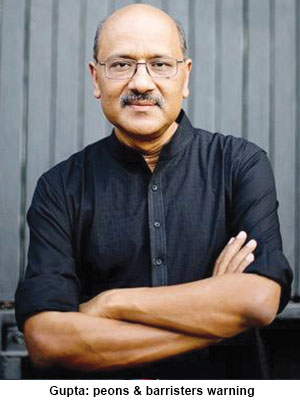 According to well-known political analyst and journalist Shekhar Gupta, the three-language formula proposed by NEP 2020 insinuates that English is a foreign language. “If there is one thing our politicians, especially those with an ear to the ground understand… it is the reality that voters want three things from their children’s schooling — English, English, English,” he opines (Business Standard, August 1).
According to well-known political analyst and journalist Shekhar Gupta, the three-language formula proposed by NEP 2020 insinuates that English is a foreign language. “If there is one thing our politicians, especially those with an ear to the ground understand… it is the reality that voters want three things from their children’s schooling — English, English, English,” he opines (Business Standard, August 1).
In Gupta’s opinion, a major factor behind the comprehensive electoral rout of the CPM (Communist Party of India-Marxist)-led Left Front government which had ruled West Bengal (pop. 91 million) uninterruptedly for 34 years (1977-2011), was Trinamool Congress party leader Mamata Banerjee’s persistent reminder to voters that “for decades, the Left had condemned their generations to Bengali-medium education, while their own children went to English-medium schools”. “The result, she said, was that while your children were begging for peons jobs, the comrades’ children were going to England and becoming barristers,” writes Gupta.
Nevertheless although the downsides of NEP 2020 are over-bureaucratisation, palpable prejudice against privately-promoted education institutions, medium of instruction and obfuscation of the issue of financing, given the comprehensive reforms suggested in NEP 2020, it’s quite possible that its upsides could outweigh its downsides.
The most important recommendation of the KR Committee incorporated into NEP 2020 in toto, is for immediate provision of formal early childhood care and education (ECCE) for all children up to eight years of age. The new policy charter (para 1.3) directs the National Council for Educational Research & Training (NCERT) to urgently draw up a national curricular and pedagogical framework for ECCE divided into a sub-framework for 0-3 year-olds, and 3-8 years-olds.
“Universal provisioning of quality early childhood development, care and education must be achieved as soon as possible, and no later than 2030 to ensure that all students entering Grade I are schools ready,” says NEP 2020 (para 1.1). To this end, accepting the recommendation of the KR Committee, NEP mandates that henceforth the 10+2 school system which took no cognition of ECCE, is reconfigured into a 5+3+3+4 preschool to class XII design to provide children a strong foundation for tertiary education.
Under this newly designed school system, all children will be provided three years of play-based preschool education followed by two years of preparatory classes up to age eight, followed by three years of primary school preparatory learning, three years middle stage education and four years in secondary and higher secondary classes. By incorporation of formal ECCE into the learning continuum the 10+2 system has been extended to 15 years of school, a long overdue reform.
The other positive and universally acclaimed feature of NEP 2020 is intimately connected with early childhood education and nurturance. The new policy accords high importance to foundational literacy and numeracy (FLN). This mission is a belated but nevertheless welcome response to the Annual Status of Education Report (ASER) of the Pratham Education Foundation, one of the world’s most respected education NGOs. For the past 15 years, over 20,000 Pratham volunteers — mainly college and university students — have been field testing primary school children in rural India to assess their reading and numeracy skills.
The ASER surveys have been warning that year after year the foundational literacy — reading and numeracy — skills of rural primary school children in over 500 of India’s 730 districts have been declining, especially in government schools. “Various governmental as well as non-governmental surveys indicate that we are currently in a learning crisis: a large proportion of children in elementary school — estimated to be over 5 crore (50 million) in number have not attained foundational literacy and numeracy, i.e, the ability to read and comprehend basic text and carry out basic addition and subtraction with Indian numerals,” admits NEP 2020 (para 2.1). Therefore, the policy document has decreed that the Union HRD ministry establishes a National Mission on Foundational Literacy and Numeracy “on a priority”. “Accordingly, all state/Union territory governments will immediately prepare an implementation plan for attaining universal foundational literacy and numeracy in all primary schools identifying stage-wise targets and goals to be achieved by 2025 and loosely tracking and monitoring progress of the same (sic),” says NEP 2020 (para 2.2).
These two initiatives are music to the ears of your editors in EducationWorld. Awakened to the critical importance of ECCE for children’s orderly development and smooth induction into the education continuum by Los Angeles-based educationist philanthropist Lowell Milken, who in the early years of the new millennium owned KinderCare — the largest chain of private pre-primaries in the USA — since 2010, this publication has convened ten international conferences (latterly converted into national conferences) in Mumbai and Bangalore, to generate greater awareness of the basic principles and best practices of ECCE.
This was necessary because until then, early childhood education was widely synonymous with unstructured play and baby-sitting. Therefore, the prime importance accorded in NEP 2020 to early childhood care and education is the culmination of a long and consistent campaign for professionally administered ECCE for India’s 164 million children below five years age, conducted by EducationWorld.
This sustained campaign included strong support by this publication to the country’s estimated 55,000 private preschools and 1.4 million anganwadis — essentially nutrition centres for new borns and lactating mothers, promoted by the Central government under its Integrated Child Development Services (ICDS) programme introduced in 1976. And continuous support for the Mumbai-based Early Childhood Association (estb.2011) which has emerged as a powerful and influential voice for universal ECCE.
Indeed to its credit, the Kasturirangan Committee had gone one better by recommending seamless extension of early childhood into the first three years of primary school under its revolutionary 5+3+3+4 schooling years system which has been incorporated in toto into the new education policy.
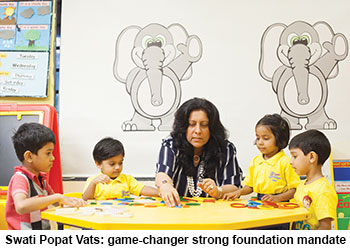 “NEP’s acknowledgement of the critical importance of ECCE and extension of its duration to class III during which all children will joyfully acquire foundational literacy and numeracy — if implemented diligently in the country’s 1.4 million anganwadis and primary schools — could prove to be a game-changer in Indian education. It will build a strong foundation for all future learning. We are jubilant that our long-time advocacy of universal professionally-provided ECCE has paid off. But simultaneously we have directed all our regional offices to ensure that state governments implement the ECCE reforms proposed in NEP 2020, in all anganwadis, pre and primary schools countrywide,” says Dr. Swati Popat Vats, president of Podar Jumbo Kids, a 498-strong chain of preschools and founding president of the Early Childhood Association of India (estb.2011) which has a membership of 38,000 preschools countrywide.
“NEP’s acknowledgement of the critical importance of ECCE and extension of its duration to class III during which all children will joyfully acquire foundational literacy and numeracy — if implemented diligently in the country’s 1.4 million anganwadis and primary schools — could prove to be a game-changer in Indian education. It will build a strong foundation for all future learning. We are jubilant that our long-time advocacy of universal professionally-provided ECCE has paid off. But simultaneously we have directed all our regional offices to ensure that state governments implement the ECCE reforms proposed in NEP 2020, in all anganwadis, pre and primary schools countrywide,” says Dr. Swati Popat Vats, president of Podar Jumbo Kids, a 498-strong chain of preschools and founding president of the Early Childhood Association of India (estb.2011) which has a membership of 38,000 preschools countrywide.
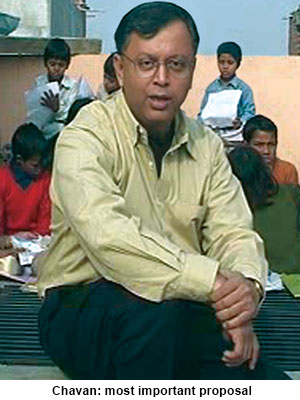 The heavy emphasis on early childhood care and education and universal foundational literacy and numeracy, is the brightest feature of NEP 2020 and if implemented with grit and determination — especially in the country’s 1.4 million anganwadis, 1.2 million government schools and 400,000 budget private schools — it has the potential to cancel all mistakes of the past several decades and fortify the crumbling foundations of contemporary India’s education system. “The single most important proposal in the new policy is the one that lays down a clear implementation direction for (state and local) governments to attain universal literacy and numeracy in all primary schools by 2025… Pratham’s Annual Status of Education Report (ASER) has been focusing on foundational skills. We have also demonstrated on a large scale, year after year, that the problem can be solved relatively easily. It is natural for us to hope this one initiative is implemented in all seriousness,” says Madhav Chavan, founder-director of Pratham in an essay written for the Economic Times (August 2).
The heavy emphasis on early childhood care and education and universal foundational literacy and numeracy, is the brightest feature of NEP 2020 and if implemented with grit and determination — especially in the country’s 1.4 million anganwadis, 1.2 million government schools and 400,000 budget private schools — it has the potential to cancel all mistakes of the past several decades and fortify the crumbling foundations of contemporary India’s education system. “The single most important proposal in the new policy is the one that lays down a clear implementation direction for (state and local) governments to attain universal literacy and numeracy in all primary schools by 2025… Pratham’s Annual Status of Education Report (ASER) has been focusing on foundational skills. We have also demonstrated on a large scale, year after year, that the problem can be solved relatively easily. It is natural for us to hope this one initiative is implemented in all seriousness,” says Madhav Chavan, founder-director of Pratham in an essay written for the Economic Times (August 2).
Perhaps because the new education policy has been articulated after a prolonged hiatus of 34 years during which the world has changed beyond recognition with the dawn of the Internet, robotics, artificial intelligence era, NEP 2020 is somewhat too ambitious. It decrees the establishment of several dozens of supervisory committees, overhaul of infrastructure, appointment of a large number of well-paid teachers who need to be given thorough training, establishment of an Indian Education Service, provision of facilities for skill training in all government schools and HEIs, as also revival of the adult education programme within prescribed time frames. All this is likely to land the Centre and states with huge additional bills at a time when the economy is in the doldrums, following lockdown of business and industry for over four months in the wake of the Covid-19 pandemic.
Members of the KR Committee and formulators of NEP 2020 seem scarcely bothered about how these reforms will be funded, even as it candidly admits that allocation of 6 percent (Centre plus states) of GDP for public education recommended by the Kothari Commission way back in 1968, reiterated by NPE 1986, and reaffirmed by the policy review of 1992 has remained wishful thinking.
NEP 2020 claims that current annual expenditure for public education is 4.43 percent (2017-18) and 10 percent of total government expenditure and acknowledges “that these numbers are far smaller than most developed and developing countries” (para 26.1). Most independent monitors of the economy believe that 4.43 percent is an over-estimate. The independent Centre for Monitoring Indian Economy pegs it at 3 percent. In the circumstances, the new policy’s appeal for a “substantial increase in the education sector… to reach 6 percent of GDP at the earliest” is likely to fall on deaf ears as similar pleas have fallen during the past six decades.
Certainly the auguries of a meaningful increase in government spending for public education are not good. With the forced lockdown of the economy for over four months, the GDP budgeted to increase by 10 percent in fiscal 2020-21, is likely to contract by 5-9 percent this year. This is certain to severely reduce the direct and indirect tax receipts of the Central and state governments. As a result, the fiscal deficit of the Union budget which after much straining and sophistry was pegged at Rs.7.96 lakh crore, equivalent to 3.5 percent of GDP, is set to double this fiscal, with the BJP government at the Centre showing no sign of slashing establishment expenditure which consumes 20 percent of its total annual revenue. In the circumstances, it will be a wonder if the HRD/education ministry’s budgetary allocation of Rs.99,300 crore, equivalent to a mere 0.43 percent of GDP, is not slashed, let alone increased. Ditto state governments which tend to be less fiscally prudent.
Therefore, larger allocation for education is ruled out for fiscal 2020- 21. And next year (2021-22), the focus of the Central and state governments will be industry and business recovery with priority accorded to investment in infrastructure to get the wheels of the economy rolling again. Therefore, social sector spending is unlikely to be increased in 2021-22 either.
Even though the recommendation to raise government expenditure for public education to 6 percent to finance the momentous reforms of NEP 2020 is likely to suffer the fate of NPE 1968 and 1986/92, the policy document makes it clear that other options are ruled out for ideological reasons. An option available to the BJP/NDA government which claims that it is not wedded to Nehruvian socialism, is to adopt the school education vouchers programme advocated by a rapidly rising number of educationists and economists.
 “The average per-child expenditure incurred by the Central and state governments in public schools is Rs.25,000 per year, which is substantially more than spent by 70 percent of private schools. Despite this, there is a continuous outflow of children from free-of-charge government to fees-levying private schools. In the circumstances, it would be advisable for governments to directly transfer the Rs.25,000 per-child expense that it incurs annually, to parents of school-going children by way of school education vouchers to enable them to enrol their children in schools of their choice. In the long run, the K-12 system will become stronger because the incomes of affordable schools will increase, learning outcomes will improve and government schools will be forced to upgrade to attract and retain students. Funding students instead of schools is a win-win strategy that will improve the school education system without substantial additional government expenditure,” says K. Yatish Rajawat, a commerce alum of Delhi and Mumbai universities, former journalist (Hindu Business line, Economic Times and former editor of DNA) and currently president of the Centre for Civil Society, the well-reputed Delhi-based think tank which has an excellent track record in K-12 education research.
“The average per-child expenditure incurred by the Central and state governments in public schools is Rs.25,000 per year, which is substantially more than spent by 70 percent of private schools. Despite this, there is a continuous outflow of children from free-of-charge government to fees-levying private schools. In the circumstances, it would be advisable for governments to directly transfer the Rs.25,000 per-child expense that it incurs annually, to parents of school-going children by way of school education vouchers to enable them to enrol their children in schools of their choice. In the long run, the K-12 system will become stronger because the incomes of affordable schools will increase, learning outcomes will improve and government schools will be forced to upgrade to attract and retain students. Funding students instead of schools is a win-win strategy that will improve the school education system without substantial additional government expenditure,” says K. Yatish Rajawat, a commerce alum of Delhi and Mumbai universities, former journalist (Hindu Business line, Economic Times and former editor of DNA) and currently president of the Centre for Civil Society, the well-reputed Delhi-based think tank which has an excellent track record in K-12 education research.
A second option available to the Central government to fund NEP 2020 is to accord development of the country’s high-potential human resource highest priority and undertake a massive resource mobilisation initiative in the Union Budget 2021- 22. Your editors have repeatedly presented resource mobilisation schema for one-time investment of Rs.8 lakh crore for the education and primary healthcare of the world’s largest child and youth population (see www. educationworld.in/union-budget 2020-21-small-change-for-humancapital-development/). The reflex reaction of government and latter day liberal economists is that additional taxation and resource mobilisation even for best causes, is likely to disincentivise business and industry leaders and prompt capital flight
Yet distinguished economists Abhijit Banerjee and Esther Duflo have adduced impressive evidence to prove this nostrum is highly questionable. In their latest must-read book Good Economics for Hard Times (see p.94) these MIT, Boston professors report that RCTs (randomised controlled trials) conducted by them in several countries belie the popular belief that additional taxation for demonstrable public good disincentivises high income individuals. Similarly, it’s impossible for your correspondent to accept that a one-time massive resource mobilisation drive to lift India’s public education system out of the morass in which it has been mired for the past century will be resented by leaders of industry and business who are well aware of the productivity gains that a well-educated workforce will contribute to industry, agriculture and the services sector.
Moreover even if not overtly, industry leaders are subliminally aware of French economist Thomas Piketty’s warning (Capital in the Twenty-first Century (2013)) that rising income and wealth inequality — for which universal quality education is the best panacea — poses a grave threat to law and order and social stability, in particular to democratic societies. Therefore, it is submitted that the schema proposed by EducationWorld to urgently recast the next Union budget to mobilise Rs.8.09 lakh crore is accepted by the BJP/NDA government to attain the goals of NEP 2020.
“India will have the highest population of young people in the world over the next decade, and our ability to provide high-quality educational opportunities to them will determine the future of the country,” says NEP in its introductory paragraph.
Indeed, the stakes are high. And as the authors of NEP 2020 repeatedly stress throughout this policy document, a massive, concerted effort to raise the floor of the education system from preschool to Ph D is an urgent national priority. But to engineer this national priority government, the establishment and society need to collectively bite the bullet and take hard decisions including co-option of private education, massive resource mobilisation and de-bureaucratisation of Indian education.
led post-independence India’s suboptimal education system for the past seven decades are not seriously addressed, like its predecessor policy declarations, NEP 2020 will remain another high rhetoric charter lost in the eddies and currents of implementation.
NEP 2020 highlights
The Union Cabinet of the BJP/NDA 2.0 government approved the National Education Policy (NEP) 2020 on July 29. Formulated over a period of four years and based on the recommendations of the T.S.R Subramanian Committee Report (2016) and draft NEP of the Dr. K. Kasturirangan Committee (2017-19), NEP 2020 replaces the National Policy on Education (NPE), 1986/92.
School education
- NEP 2020 is aligned with the United Nations SDG-4 of all children from preschool to secondary level in school education by 2030.
- The policy mandate is to re-induct 20 million out-of-school children back into mainstream education.
- The current 10+2 system to be replaced by a new 5+3+3+4 curricular structure corresponding to ages 3-8, 8-11, 11-14, and 14-18 years. The new system will have 12 years of schooling with three years of anganwadi/preschool learning.
- Every child to attain foundational literacy and numeracy by class III (age eight). Vocational education to start from class VI with internships.
- Medium of instruction until class V or preferably until class VIII to be in mother tongue/regional language “wherever possible”. The three-language formula to be followed.
- Assessment reforms with 360 degree holistic progress card to track students progress. Examinations by appropriate authority in classes III, V and VIII.
- A new and comprehensive National Curriculum Framework for Teacher Education (NCFTE 2021) will be formulated by the NCTE in consultation with NCERT. By 2030, the minimum degree qualification for teaching will be a four-year integrated B.Ed degree.
Higher Education
- Gross Enrolment Ratio in higher education to be raised to 50 percent by 2035; capacity in higher education to be expanded by 35 million.
- NEP 2020 introduces broad based, multi-disciplinary, holistic undergraduate education with flexible curricula, creative combinations of subjects, integration of vocational education and multiple entry and exit points with appropriate certification. Undergrad programmes can be of three-four years with multiple exit options and certification.
- Academic Bank of Credits to be established to facilitate transfer of credits.
- Multidisciplinary Education and Research Universities (MERUs) on a par with IITs, IIMs, to be promoted countrywide as models of best multidisciplinary education of global standards.
- National Research Foundation to be the apex body for developing a strong research culture and building research capacity in higher education.
- A Higher Education Commission of India (HECI) will be an overarching umbrella body for all higher education, excluding medical and legal education institutions. Four independent verticals — the National Higher Education Regulatory Council (NHERC) for regulation, General Education Council (GEC) for setting standards, Higher Education Grants Council (HEGC) for funding, and National Accreditation Council (NAC) for accreditation, to be established under HECI. Public and private higher education institutions will be governed by the same set of norms for regulation, accreditation and academic standards.
- College affiliation with universities to be phased out in 15 years and a mechanism for granting graded autonomy to colleges to be instituted. Over a period of time, every college will either develop into an autonomous degree-granting college or a constituent college of a university
Others
- An autonomous National Educational Technology Forum (NETF) to be established to provide a platform for the free exchange of ideas on the use of technology to improve learning, assessment, planning, administration.
- NEP 2020 mandates a Gender Inclusion Fund and Special Education Zones for under-developed regions and socioeconomically disadvantaged groups (SEDGs).
- The new policy favours multilingualism in schools and higher education. National Institute for Pali, Persian and Prakrit, Indian Institute of Translation and Interpretation to be promoted.
- The Centre and the states will work together to increase investment in public education to reach 6 percent of GDP at the earliest.
Source: Union HRD ministry & PIB
NEP 2020 selected reactions
 I’m happy that the multi-disciplinary approach we have been practicing is recognised as the right way to prepare students for challenges in their careers. We are also pleased that continuous assessment will be the way to evaluate students, which is something we believe in — Dr. Malabika Sarkar, vice chancellor, Ashoka University, Delhi
I’m happy that the multi-disciplinary approach we have been practicing is recognised as the right way to prepare students for challenges in their careers. We are also pleased that continuous assessment will be the way to evaluate students, which is something we believe in — Dr. Malabika Sarkar, vice chancellor, Ashoka University, Delhi
What we are most thrilled about is the universal access to early childhood care and education (ECCE). As part of the new structure, foundational learning (3-8 years) shines much needed light on the importance of early education between 3-6 years — A.K. Srikanth, CEO, Klay Preschool and Daycare, Bangalore.
 The policy has a multi-disciplinary, values-based approach focusing on holistic education along with life-skills with special emphasis on skill development to improve employability of students. I’m pleased that the policy lays special emphasis on early childhood care and education (ECCE) and development and endorses play-based, multi-faceted curriculums. Universalisation of ECCE will lay the foundation for the development of every child — Rustom Kerawalla, chairman, Ampersand Group, Mumbai.
The policy has a multi-disciplinary, values-based approach focusing on holistic education along with life-skills with special emphasis on skill development to improve employability of students. I’m pleased that the policy lays special emphasis on early childhood care and education (ECCE) and development and endorses play-based, multi-faceted curriculums. Universalisation of ECCE will lay the foundation for the development of every child — Rustom Kerawalla, chairman, Ampersand Group, Mumbai.
Pedagogical research has established beyond doubt that children learn best if they learn in their mother tongue (or local language) in primary classes. This does not mean that children should not learn English, it only means that English should not be the medium of instruction in the primary years — Sridhar Rajagopalan, co-founder and chief learning officer, Educational Initiatives, Ahmedabad.
 Technology will now play a much bigger role not just in planning and administration, but pedagogy, content, tutelage and assessment. With reduced insularity and greater freedom for students to select their subjects of choice, the focus will return to holistic learning, rather than a bent towards maths and sciences. — Divya Lal, managing director of Fliplearn Education, Delhi.
Technology will now play a much bigger role not just in planning and administration, but pedagogy, content, tutelage and assessment. With reduced insularity and greater freedom for students to select their subjects of choice, the focus will return to holistic learning, rather than a bent towards maths and sciences. — Divya Lal, managing director of Fliplearn Education, Delhi.
By giving students a chance to pick non-conventional subjects which focus on right brain development, NEP 2020 opens a wide variety of career options. With clear inspiration drawn from the western education system, this new policy will help students excel in subjects of their choice and explore the realm of education with newer outlook — Dharini Upadhayaya, co-founder and co-CEO, Furtados School of Music, Mumbai.
I am delighted to see a diverse policy that meets future learning needs which will engrain practical skill-based learning to shape young learners become industry-ready. The policy addresses most of the critical issues that daunt our current education landscape and brings about a totality in terms of the paradigm shift that we need for educated and skilled people in India — Dr. Niranjan Hiranandani, provost, HSNC University, Mumbai.
 We laud the inclusion and focus given to early childhood care and education. ECCE plays a vital role in building a foundation for lifelong learning and well-being of every child. Moreover, the National Mission on Foundational Literacy and Numeracy is the need of the hour. This comprehensive education policy is now aligned to global standards — Prajodh Rajan, co-founder & CEO, EuroKids International, Mumbai.
We laud the inclusion and focus given to early childhood care and education. ECCE plays a vital role in building a foundation for lifelong learning and well-being of every child. Moreover, the National Mission on Foundational Literacy and Numeracy is the need of the hour. This comprehensive education policy is now aligned to global standards — Prajodh Rajan, co-founder & CEO, EuroKids International, Mumbai.
NEP 2020 is bold and refreshingly transformative. It is disruptive in the way it looks at education and hence building the future generation. It signals the end of rote and brings in assessments based on application of core concepts, introduces skills from class VI onwards, enabling every child to have at least one skill by the end of school education — Narayanan Ramaswamy, national leader, education and skill development, KPMG (India).
We applaud the Indian government’s vision to increase the Gross Enrolment Ratio (GER) in higher education from 25.7 percent currently to 50 percent by 2030. The government acknowledges that online and distance education will play a key role in achieving this goal by enhancing offerings, improving access and providing increased opportunities for lifelong learning — Rajiv Shah, CEO & director,  NMIMS Global Access School for Continuing Education, Mumbai.
NMIMS Global Access School for Continuing Education, Mumbai.
What excites me most in the NEP is the policy to bring trans-disciplinary and liberal arts learning into higher education, the idea of a unified regulator for higher education, aspiration to establish large globally competitive multi-disciplinary universities and the possibility of foreign universities entering India. Building a National Research Fund and a National Credit Bank are also new and pathbreaking initiatives — Atul Khosla, pro vice chancellor, Shoolini University, Himachal Pradesh.
be introduced to facilitate top foreign universities to set up in India. The law will provide special dispensations to foreign universities from regulatory, governance and content standpoints. We hope the new law will make it feasible for foreign universities to enter the Indian market. This move will facilitate access to quality higher education — Rukshad Davar, Partner at Majmudar & Partners International Law, Mumbai.





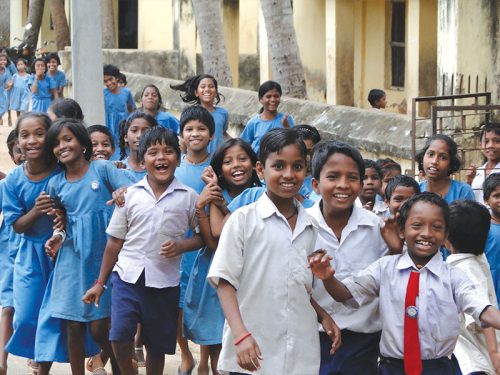










Add comment